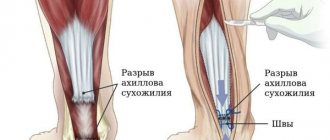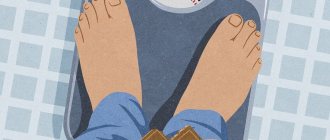What is a "breakdown"
I was on a diet, ate right, counted calories, didn’t allow myself anything sweet, not even buckwheat or pasta, if we were talking about low-carb or keto, and then - BAM! - darkness... And then you find yourself on a mountain of candy and chocolate wrappers, an empty bucket of ice cream on your head, a half-eaten piece of cake in your hand, your stomach is so full of sweets that it’s hard to breathe. Congratulations - you've nailed it! Happens.
This also happens with training. You go like hell 4-5 times a week to the gym and the stadium, and then you can’t force yourself to get there. Even kick and drag. Of course, in this case the breakdown does not occur as sharply as in nutrition, but the thing is no less dangerous.
I missed a workout once, I missed two, and then I didn’t even notice how a couple of months flew by without jogging or “rocking.” This has happened to me once in the 20 years that I have been training with weights. One time that turned into an eight month break.
That is, a breakdown is a sudden overeating on a diet and an unexpected break in training, which can be dangerously prolonged.
The right steps: what to do if you fall off your diet
Nutritionists say that not in every case, when we break our diet, irreparable harm is caused to the body. And in general, only those who do not live do not make mistakes, therefore it is quite natural for a person to make mistakes. So what should you do if you have eaten harmful “snacks”, what is the right thing to do and how to “atone”?
No panic
As everyone’s favorite character from the Soviet cartoon said, “Calm, the main thing is calm!” No tragedy happened, and all the consequences of the breakdown can be “treated.” You cannot panic, start blaming, or, especially, blame yourself.
This can only lead to depression or a nervous breakdown, which in itself is already bad. Therefore, you need to do everything meaningfully, accept the failure, make friends with it, accept it as something accomplished.
Back to square one
Having calmed down and forgiven yourself for your lack of willpower, you can move on to the next step. Perhaps the reason for unexpected overeating was an incorrectly chosen diet or a lack of calories that you consumed the day before.
You need to review all the influencing factors, understand them, and then choose the type of diet that suits you best. Maybe it’s enough to just give up unhealthy foods and not starve yourself on kefir and apples alone.
Fasting day after a diet break
A breakdown does not always lead to rapid weight gain. To gain back just one kilogram, you need to eat two medium pizzas, washing down the whole thing with a couple of liters of sweet soda. In addition, one day of abundant “overeating” is not at all a reason to continue in the same spirit in the future.
Give yourself a deload the next day. Scientists believe that therapeutic fasting is good for health. This way you can “punish” yourself without causing harm to your health. However, this is not at all necessary; you can simply return to your usual routine.
More water
It is important not to forget about a sufficient amount of fluid, especially with such strict restrictions. Prepare plenty of fluids for yourself the day after a breakdown - this will help burn unnecessary fat. Water with lemon is good for this; there is a separate article about its benefits. Recipes for water with citrus and ginger are also already available on our website.
Such measures will be relevant even if you are wondering what to do if you have fallen off your drinking diet. The main thing is to remember why you took up this business in the first place, what prompted you to adhere to such a diet.
We burn off what we gained through training
If the breakdown was not serious, for example, one bun or a couple of sweets, then you don’t have to do anything at all. But if you overeat, then you should “assign” yourself an additional workout.
Moreover, it is not at all necessary to exhaust yourself for an hour in the gym or on the treadmill. Let these be familiar exercises in an established mode. It’s better to work out an extra time a week than to exhaust yourself with unbearable loads.
Good sleep is the key to health
If you relapse, this does not mean that you have lost willpower or motivated yourself incorrectly. Perhaps you just need to get a good night's sleep due to physical or psychological fatigue.
Go to bed early. Scientists say that the best sleep is from eleven in the evening to seven in the morning. You should sleep for at least six hours, or even better, all eight. Before this, take a relaxing warm bath or shower, do a light massage with a scrub, apply milk to your body and go to bed.
Mrs. Motivation
We return again to the topic of proper “iron” motivation. The circumstances that prompted you to decide to start a diet must be so significant that they overcome the desire to eat all the sweets in the house. Even if you relapse, think about it again. Maybe the goal wasn't as important as it seemed.
Realize that obese people usually lose health, suffer from cardiovascular diseases, and develop diabetes. You may find better reasons to eat right than you ever thought of.
Celebrate your results and celebrate
To get the best result, you need to see how the process itself goes. Keep a weight loss journal and a habit of keeping track of all the changes that happen to your body. The results of the failure against the background of previous victories will no longer seem so monstrous.
Don't forget about rewards and surprises for your loved one. The main thing is that they are not food grade. Celebrate your small victories with an extraordinary trip to the cinema without popcorn, buying a new item or hand-made supplies. This will improve your emotional state, which will help you no longer break down.
Why does a breakdown occur and how to avoid it
There are many reasons: fatigue of the central nervous system (CNS), basic instincts, physiology and even psychology. Moreover, failure factors are usually intertwined.
If we dig really deep, we get to hormones, biochemistry and the basic reward system. Most readers will put such details to sleep, so I’ll limit myself to a simple, albeit exaggerated example (don’t do as it’s written there, don’t organize bad marathons with unbalanced and hungry mono-diets).
The man decided to go on a diet and, as often happens, tightened all the screws to the maximum. He eats nothing except buckwheat, grass and a strong belief in his own abilities. And this is after total food debauchery in the form of uncontrolled consumption of sweets, pickles, beer, hamburgers, ice cream and other tasty, but unhealthy things.
On the one hand, bad things happen to the body, because such a drastic change in diet and reduction in calories is a big stress for it. On the other hand, the body does not care that the owner wants to lose weight, it only cares about survival and having an energy reserve in case the stressful situation repeats.
First of all, it pumps the body with hormones, forcing it to increase search activity in order to feed itself. I think those who have lost weight remember this feeling of euphoria and vigor in the first few days, or even a week after starting a cruel diet. A person thinks how strong he is, he does everything right, the diet works - life is wonderful. But in fact, this is only a basic defense mechanism, working on instincts. Something akin to a powerful release of adrenaline in a critical situation, so that a person can either quickly run away from danger or confidently attack the enemy.
What happens after a period of hyperactivity in a critical situation? Right! A period of severe loss of strength. The same thing happens during thoughtless manipulations with the diet, only the time intervals are different. In the first case, we are talking about minutes or even seconds. In the second - about days or about a week and a half.
That is, the body turns on energy saving mechanisms, reducing brain and motor activity. You feel sleepy, sluggish and at the same time struggling with a constant feeling of hunger and the desire to devour everything that is not nailed down. Moreover, it is desirable that the food be higher in calories, fattier, and sweeter - these are also instincts.
Thus, at first the nervous system was inflated by hormones that forced it to increase activity, which greatly affected its resources. And then she is exhausted by hunger. Like muscles, the resource of the nervous system is not infinite. When it ends, a breakdown occurs. For some it is earlier, for others it is later, but it happens.
At a basic level, all this is also regulated by hormones, including serotonin (the so-called happiness hormone), which is associated not just with the desire to eat, but to eat harmful sweet treats. A large portion of sugar releases more serotonin than lean buckwheat or boiled chicken breast.
How to solve a problem?
In terms of logic, it’s simple, but implementing the solution in reality is more difficult, but nothing is impossible. Judge for yourself, if you can’t live without serotonin and other happiness hormones, you just need to find another way to get them. After all, they are released not only in response to the intake of certain nutrients.
You were praised by friends and acquaintances - this is the release of a small portion of serotonin. Finished a difficult task - another release of happiness hormones. I saw in the mirror the result of 4 months of work in the form of six-pack abs and powerful biceps - a little more serotonin for the piggy bank. I published this result on Instagram, received enthusiastic comments, and the body again responded with a portion of good hormones. You got behind the wheel of an expensive car or entered your own well-furnished new apartment, for which you have worked in the last months or several years - receive encouragement from your body in the form of a pack of happiness hormones.
Of course, it’s easier to eat something delicious than to follow a training and nutrition regimen day after day for months or to work on your own business (or even work in both directions at once), but the final result is completely different, it differs by orders of magnitude. Get a little here and now, or a lot, but after some time.
Yes, you will have to spend more energy, but in addition to a powerful portion of happiness hormones and a large amount of them, you also get other advantages. A beautiful, strong and healthy body, financial independence, recognition and gratitude from other people if you do something useful for them. Plus, in the process of achieving a big goal, habits change and what was previously difficult and stressful becomes a way of life, and you also begin to enjoy it. From a balanced diet and a feeling of peace in the stomach, from training and a feeling of strength, muscle tone, from a job well done, from order in the house and in the family.
It takes an average of three weeks for any habits to form or disappear - good and bad. By systematically moving towards a big goal, there is a chance to form a pool of good habits by getting rid of bad ones.
That is, the solution is the following - set big, but realistic goals and focus on them, and not on momentary pleasure. It’s hard, you want quick pleasure here and now - at this very moment, think about what you will achieve in the end if you don’t fail. That is why it is important to set clear goals so that you can imagine a real result, which will help you not go astray and not be distracted by trifles. And if you get lost, then a big goal and a clear idea of it will help you get back on track .
The most important thing is that you should not overestimate short-term efforts (lose 20 kg in a month) and you should not underestimate long-term efforts (get yourself more or less in shape in 4-6 months). When you do a little, but every day for a long time, the final result will be impressive. This is what I slowly achieved in 2013 as I worked toward my goal day after day.
One of my inspirations then was Denis Borisov , whose work I recommend for study to those who want to replenish their knowledge base about what is important and useful for self-development (website, YouTube, Instagram).
Since then, I have developed a number of useful habits, continued to develop in the chosen direction, after which I set the goal of achieving peak form for myself (and really understanding the issue deeply, I was tired of experiments and searching for pearls in the information manure). This took 4.5 months of systematic work (the first photo on the left is the end of March 2021, weight - 104.5 kg; on the right and a couple of photos below - the end of August 2021, weight - 96.5 kg):
This time I was inspired by the works and direct help of Yaroslav Brin (Instagram, YouTube, website) - I also highly recommend studying it.
Don't forget about my own column on healthy lifestyle and sports . What is this for? Everything is simple when it comes to self-development in any area - no one will give you a ready-made recipe , but you can find a lot of useful information that adapts to your own realities. You read, adapt, take and do . Little by little, but every day and over a long period of time.
Nevertheless, as I wrote at the beginning, everyone has breakdowns and it is important to minimize the consequences.
What are eating disorders?
Eating disorders (EDs) include a number of diseases: from bulimia and compulsive overeating to anorexia nervosa and perverted appetite. An unhealthy relationship with food and/or a distorted body image can lead to irreparable consequences: for example, anorexia has the highest mortality rate of all mental disorders [1]. In this material we will look at what to do if you notice signs of eating disorder in your loved ones.
How to recognize eating disorders?
Most eating disorders involve excessive attention to one's weight, body shape, and food [2]. There are also so-called “red flags” that will indicate the need to contact a specialist. They can appear individually or in combination, with many variations. Among them:
- skipping meals;
- adopting an overly restrictive diet;
- constant worry about obesity, talking about losing weight;
- using various products and dietary supplements for weight loss;
- going to the toilet while eating;
- excessive physical activity, etc.
Some eating disorders may have visible signs: for example, if a person has bulimia, it may manifest itself as problems with tooth enamel. The reason for this is repeated vomiting.
What to do if you notice signs of eating disorder in a loved one?
The first step is conversation [3]. For it, you need not only to choose a place and time, but also to prepare: learn more about eating disorders from reliable sources and, perhaps, write down the main points that you are going to convey to your interlocutor. In a conversation, it is better to concentrate on your observations and feelings and use the pronoun “I” instead of “you”: “I notice that”, “I am worried” - this way the person will not feel reproached and deny your observations.
At the same time, be firm and do not offer simplistic solutions: your loved one must understand the problem and the possible health consequences. Phrases like “just eat” will not help here, nor will devaluing the problem and constructs like “you need treatment.” Also, be prepared for negativity: not everyone will be happy that their problem was noticed. The person may react with hostility and dismiss concerns. In this case, your task is to confirm your observations and make it clear that you care. If after the conversation the person decides to seek professional help, support him.
Where to look for help?
Unfortunately, in Russia there are not many specialized clinics where they can help people with eating disorders. For example, Moscow residents can receive free medical care at a clinic opened at the Psychiatric Clinical Hospital No. 1 named after. ON THE. Alekseev [4] and paid assistance at the Center for the Study of Eating Disorders [5].
It is worth noting that treating such disorders is not easy: depending on the type of eating disorder and the specific case, a psychiatrist, psychotherapist, endocrinologist, nutritionist and other specialists may be required. To begin with, you can contact your doctor, psychotherapist, or look for a support group.
Where can I read about eating disorders?
To support a loved one with an eating disorder through all stages, both he and you need to learn more about the illnesses. It is better to get information from trusted sources. Here are some useful resources:
- American National Eating Disorders Association, www.nationaleatingdisorders.org,
- European Academy of Eating Disorders, www.aedweb.org,
- book “Food for Joy”, Elena Motova,
- “Body, food, sex and anxiety”, Yulia Lapina.
How to help yourself?
In the process of helping a loved one, it is important not to burn out and maintain a stable emotional state, otherwise all efforts will be in vain. Feel free to ask your loved ones for support, contact a psychologist (if you feel the need), relax and do things that will help you take your mind off your problems.
Sources:
- https://eatingdisorderscoalition.org.s208556.gridserver.com/couch/uploads/file/fact-sheet_2016.pdf
- https://www.mayoclinic.org/diseases-conditions/eating-disorders/symptoms-causes/syc-20353603
- https://www.nationaleatingdisorders.org/learn/help/caregivers
- https://krpp24.ru/
- https://cirpp.ru/
Maria Ruskova , medical journalist, restaurant reviewer
Photo depositphotos.com The author’s opinion may not coincide with the opinion of the editors
What to do to avoid this situation
Nutritionists advise avoiding strict diets, as they are more likely to lead to failure. The body is unable to function without a certain set of nutrients. As a result, the brain demands nourishing food, which causes a breakdown.
In order to avoid this, you should follow simple rules:
- Create a complete diet that includes your favorite foods. Diet food can also be satisfying. The main thing is to select products and use them for cooking.
- Down with the rules - laws are made to be broken. Severe restrictions should be avoided. This becomes the reason for the psychological desire to “go beyond.”
- “No” to fasting days - such a concept has long been outdated. Nutritionists recommend not to deprive yourself of food and not to have a fasting day on fruit or water. This will only cause an incredible feeling of hunger.
- A cheat meal means one day when you can eat forbidden food. It is recommended to have a cheat mill once a week.











